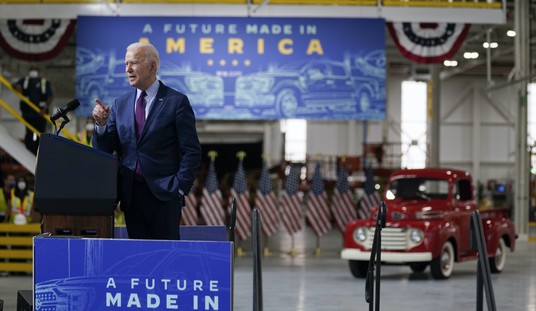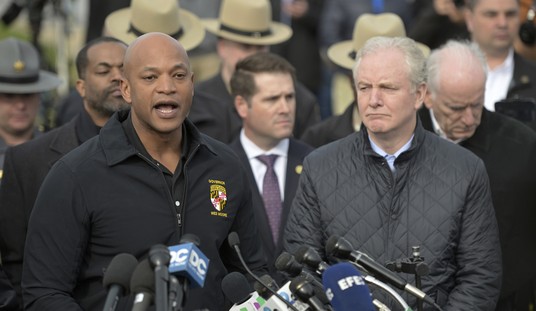Call this a triumph of nuance over plain speaking, which sounds like a good description of standard operational diplo-speak, too. The Washington Post’s Glenn Kessler — who used to work the diplomatic beat — decided to fact-check Barack Obama’s assertion this week that “I didn’t set the red line” on Syria’s use of chemical weapons, but that the world did. Kessler doesn’t assign Obama any Pinocchios for this dodge, but he doesn’t let the President off the hook, either. After spending the entire column describing the bungling that went into his August 2012 statement and the fumbling that followed over the next year, Kessler concludes:
To sum up, the president made an ill-considered rhetorical statement a year ago, without consulting his aides. But the White House staff decided they could not take it back and even considered it a useful example of firm presidential leadership when they needed to inform Congress of evidence of chemical weapons use by Syria.
But the president apparently was never comfortable with his own words. So when new talking points were crafted to make this line seem less like an “Obama red line” and more like a world-backed red line, the president bungled the language again. He made it appear as if he was denying he had called it a red line, when that was obviously not the case.
If he had used Kerry’s language, it would not have been as much of an issue: “The line I drew is the same one that the world has had for nearly 100 years.” Or something like that.
Well, except for one thing that Kessler never takes into account, which is that the world has never — never — set a red line for military intervention for just the use of chemical weapons. Since the UN General Assembly unanimously adopted the 1925 Geneva Protocol banning the use of chemical weapons, at least a half-dozen deployments have occurred before the Syrian civil war. None of them produced outside military intervention, not even the 1988 massacre of 5,000 Kurds by Saddam Hussein at Halabja. The red line creates imperatives for diplomatic and perhaps economic sanctions, but not until now has a nation proposed a unilateral intervention for chemical-weapons attacks, especially not in a civil war.
Even without that, though, Kessler acknowledges that the walkback this week was dishonest. Why no Pinocchios, then? It’s a “bungled talking point”:
Of course, he didn’t say that. So is a bungled talking point worthy of Pinocchios? We don’t try to play gotcha here at The Fact Checker, so we are inclined to leave this question to our readers. Some may find the president’s apparent discomfort with his own words more meaningful than any potential misstatement.
The last sentence is actually a good point, but just off the top of my head, I’d guess that most of Kessler’s Pinocchio assignments come from “bungled talking points.” Even without the graphics at the end, though, the dishonesty and incompetence are impossible to deny.
Update: Politifact (“Winner of the Pulitzer Prize”) issues a lame defense of Obama’s denial, but Factcheck.org is a little more categorical:
But the Chemical Weapons Convention does not spell out the consequences for violations. Rather, it states that in “cases of particular gravity,” the issue should be brought by convention states to the attention of the United Nations General Assembly and the United Nations Security Council (see page 39). It is unlikely that the U.N. would agree to military strikes as both Russia and China have repeatedly used their veto power to block action against Assad’s regime. Moreover, U.N. Secretary-General Ban Ki-moon has warned that any “punitive” action taken against Syria might lead to “further bloodshed” and hinder “political resolution of the conflict.” He also condemned a unilateral attack.
“As I have repeatedly said, the Security Council has primary responsibility for international peace and security,” Ban said at a news conference. “The use of force is lawful only when in exercise of self-defense in accordance with Article 51 of the United Nations Charter and or when the Security Council approves such action.”
As for the Syria Accountability Act (more formally the Syria Accountability and Lebanese Sovereignty Restoration Act of 2003), it states that Syria must “cease the development and production of biological and chemical weapons.” It lays out a number of economic sanctions for violations, but does not speak to military enforcement. So it may be a red line, but not a red line that authorizes military action.
Obama is correct to argue that the international community has long drawn a “red line” condemning the use of chemical weapons, but his point blurs the fact that his “red line” comment in August 2012 was made in the context of what it might take for the U.S. to get involved militarily in Syria. While Obama may have had some justification for drawing that line based on international conventions, the decision to tie U.S. military involvement to Assad using chemical weapons was Obama’s red line.
Kessler was taking a beating on Twitter, too. At one point, he noted that the decision not to assign any Pinocchios came during a discussion with his editor:
@FixingtheLeft @EdMorrissey @ByronYork actually, it was after a discussion with my editor.
— Glenn Kessler (@GlennKesslerWP) September 6, 2013
@RBPundit @FixingtheLeft @EdMorrissey @ByronYork no need to give the name so you can flame him. My name is on the column. But…
— Glenn Kessler (@GlennKesslerWP) September 6, 2013
@RBPundit @FixingtheLeft @EdMorrissey @ByronYork …I was wondering how to handle this and so went to his office to hash out the options.
— Glenn Kessler (@GlennKesslerWP) September 6, 2013
That’s what editors do, of course, and Glenn’s right — it’s his name on the column. I disagree with the decision not to assign Pinocchios, but the column is an interesting read, and he’s miles ahead of Politifact.








Join the conversation as a VIP Member